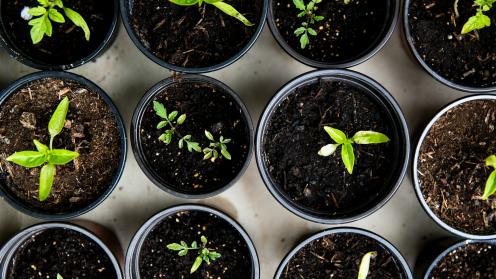“We are celebrating this Working Group’s tenth anniversary,” Working Group Co-Chair Sunil Archak (India) recalled, as delegates resumed negotiations on enhancing the Treaty’s Multilateral System (MLS) of access and benefit-sharing (ABS). The process has a long history, as was evident when delegates heard regional statements and offered suggestions on the “June 2019 draft package,” which is used as the basis for negotiations. The June 2019 package represents a “significant moment in terms of compromise and trust” in the process, as highlighted by Co-Chair Michael Ryan (Australia). It includes a draft amendment of Annex I (list of crops in the MLS), a draft revised Standard Material Transfer Agreement (SMTA), and a draft resolution on implementation.
Co-Chair Ryan highlighted two key compromises in the MLS enhancement process, in relation to expanding the scope of the MLS to all plant genetic resources for food and agriculture (PGRFA) and allowing parties to define national exemptions. On the draft revised SMTA, he outlined details of a subscription system and discussions on a single access option. He further said that the draft resolution included a section linking mandatory payments with benefit-sharing from the use of digital sequence information / genetic sequence data (DSI/GSD), referred to as PGRFA information at the time, which was not agreed.
The Co-Chairs will develop an updated negotiating draft, for consideration by the Working Group at its upcoming meeting in September 2024. They invited views to inform this work.
Regions shared views on the June 2019 package, with many lauding the Co-Chairs’ effort to clearly reflect the history of the process and outstanding matters in the meeting’s documentation. Africa stressed the need to clarify the proposed extension to “all PGRFA,” adding that a positive list of PGRFA in the MLS, rather than lists of exemptions, could result in a more effective enhancement of the system. Drawing focus to ongoing uncertainty, Canada proposed expanding application of the SMTA to non-food and feed uses of PGRFA, noting that changes to the SMTA and the Treaty will be required. The Latin American and Caribbean Group (GRULAC) highlighted the need for a mechanism on the implementation of benefit-sharing payments that enforces traceability and facilitates detection of non-payers.
Europe and North America highlighted that not all parties have notified their material, emphasizing the need for enhanced compliance. GRULAC and the Near East responded that developing countries’ compliance depends on their genebanks’ capacity and thus on developed countries’ compliance with their funding obligations. Farmers’ organizations urged respecting farmers’ right to free, prior, and informed consent before depositing farmers’ varieties into national collections.
In the afternoon, the Working Group discussed developments in other relevant fora. Delegates heard an update on discussions on DSI in the context of the Convention on Biological Diversity (CBD), presented by Kathryn Garforth, CBD Secretariat. Álvaro Toledo, Deputy Secretary, ITPGRFA Secretariat, provided an update on negotiations under the World Health Organization (WHO) for a treaty on pandemics. Delegates then heard and discussed presentations on the CGIAR’s practices regarding use of DSI; and a study on The plants that feed the world – Baseline data and metrics to inform strategies for the conservation and use of plant genetic resources for food and agriculture.
All ENB photos are free to use with attribution. For the 11th Meeting of the Ad Hoc Open ended Working Group to Enhance the Functioning of the ITPGRFA Multilateral System, please use: Photo by IISD/ENB | Anastasia Rodopoulou.


